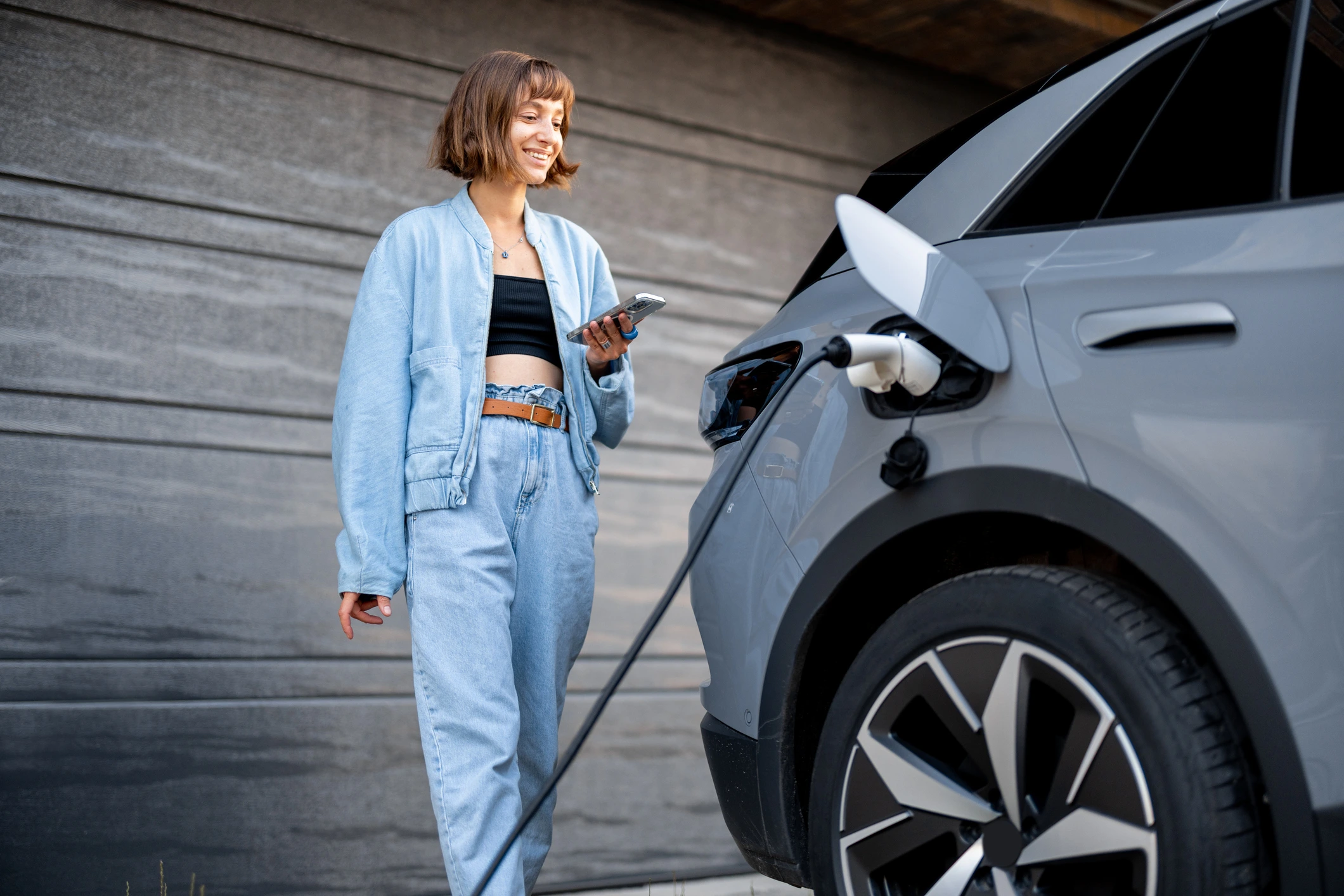October 2025
How much does it cost to charge an electric car
Find out the cost of charging an electric car at home and in public. Learn how factors like battery size, charging speed, and energy tariffs affect your EV charging expenses

Charging costs vary depending on where you’re doing the charging: At home, at work, or in public. Here's a quick overview of UK costs for a typical electric car with a 60kWh battery and around a 300 mile range:
- Home charging: About £16 for a full charge1. Smart EV tariffs like So EV can reduce this amount by about £12.
- Workplace charging: Often free if your employer provides access.
- Public charging: About £32 for a full charge2, depending on location and charger speed.
- Rapid charging: About £46 for a 30-minute top-up2 (about 90 miles), typically found at motorway services.
Factors affecting EV charging costs
There are several key factors that affect how much you’ll pay to charge your electric car:
- Battery size. Bigger fuel tanks take more petrol to fill up. Same with electric cars. If your car has a bigger battery, it takes more electricity to charge it.
- Electricity tariffs. If you charge at home, your electricity rates really matter. That’s why it pays to get an EV tariff like So EV, so you pay 6.5p/kWh3 to charge at night, instead of over 26p per kWh at a standard rate.
- Charging speed. The general rule is, the faster you charge, the more expensive it is. Charging in public at a rapid or ultra-rapid charger is convenient, but comes at a premium price.
- Location. Charging at home is usually the cheapest, especially with an EV tariff. Public chargers vary by supplier and region, with motorway services and urban areas often charging more.
Home charging costs
Charging at home is the most convenient, cost-effective way to keep your EV topped up. Most drivers simply plug in overnight so their car’s ready to go in the morning. But you do need to factor in the up-front cost of getting an EV charger installed.
Standard tariffs
This partly depends on where you live and what your standard home electricity rates and standing charges are. Fully charging a standard 60kWh electric car at a rate of approximately 26p per kWh costs around £16.
Off peak and EV-specific tariffs
This is where smart meters really prove their value. Suppliers can offer smart meter customers a smart tariff, like our So EV tariff, which means you could get a full battery for just £4.
Public charging costs
The cost of charging your EV away from home depends on charger type, location, and whether you're using a subscription or pay-as-you-go. Here's a quick breakdown:
Slow and fast chargers
Slow Chargers (3 to 7kW)
- Found at supermarkets, council car parks, and long-stay locations
- Cost: 25 to 35p per kWh (some PAYG setups average 50 to 55p per kWh)
- Charge time: 6 to 12 hours
- Access: Often free or low-cost, but some require app access or guest login
Fast Chargers (7 to 22kW)
- Located at retail parks, workplaces, and public car parks
- Cost: 40 to 60p per kWh
- Charge time: 3 to 6 hours
- Access: Free app or guest access
EV home charging vs public charging
Home EV charging easily wins on cost and convenience. It’s worth the price of getting an EV charger installed, as it’ll pay for itself in around 6 months4. Check out our range of great chargers, fully installed, from £899.
Rapid and ultra rapid chargers
Rapid chargers, typically found at motorway service stations, offer quick top-ups and are ideal for long-distance travel. But, speed comes at a higher price.
Cost: Rapid charging can cost 70p to 80p per kWh, meaning a 30-minute charge ( about 90 miles) could cost around £19 or more.
Convenience: These chargers can charge most of your battery in under an hour, making them perfect for road trips or urgent top-ups.
Trade-off: While rapid charging is less cost-effective than home charging, it’s still far cheaper and cleaner than petrol or diesel.
Pro Tip: Use rapid charging strategically, only for long journeys or when time is tight. You can rely on home or workplace charging for everyday use.
Workplace and destination charging
Workplace and destination chargers can be found at offices, hotels, retail parks, and leisure spots. They offer added convenience for EV drivers. Many employers give their staff free charging during the day, while destination chargers allow you to top up while you shop, dine or go to the cinema.
These options help cut down on public charging costs and make everyday EV use more practical.
Cost comparison - EV vs. Petrol and diesel
Electric cars remain much cheaper to run than petrol or diesel cars, especially when charged at home.
Running Costs per Mile
- EV (home charging): About = to 8p per mile (and only 1.4p with our So EV tariff)
- EV (public rapid charging): About 15 to 20p per mile
- Petrol: About 15 to 17p per mile
- Diesel: About 13 to 16p per mile
Annual Running Costs (Average)
- EV (home charging): about £1,150
- Petrol: about £2,290
- Diesel: About £2,090
Other Savings with EVs
- Lower servicing costs (20 to 30% cheaper)
- Exemptions from congestion and low-emission zone charges
- Reduced maintenance due to fewer moving parts
Tips to reduce EV charging costs
- Use off-peak tariffs – Charging overnight can cut costs massively
- Install a home charger – Avoid public fees and take advantage of cheaper energy rates.
- Plan charging stops – Choose free or low-cost public chargers when travelling.
Electric car charging costs FAQ
How much does it cost to charge an electric car in the UK?
Charging at home costs around £16 for a full charge (60kWh battery). Public charging can cost £26 or more, depending on speed and location. Get an EV charger with us and sign up to our So EV tariff and you could be paying just 6.5p per kWh. That’s just 1.4p per mile.
How much does it cost to drive 100 miles in an EV in the UK?
With home charging, it costs about £5 to £8. Using public rapid chargers, it can be £15 to £20. Still cheaper than petrol.
Is charging an electric car cheaper than buying fuel?
Yes, especially with home charging. EVs are generally 30 to 50% cheaper to run than petrol or diesel cars.
How much will my electric bill go up with an electric car?
Expect an increase of around £40 to £60 per month, depending on your driving habits and tariff. Off-peak charging tariffs, like So EV, can reduce this.
Footnotes
1 The current Ofgem Price Cap https://www.ofgem.gov.uk/information-consumers/energy-advice-households/energy-price-cap-explained
2 https://www.zap-map.com/ev-stats/charging-price-index
3 With So EV, you can charge your electric car for 6.5p per kWh between the hours of midnight and 5am.
4 This figure is based on an installation cost of £899 (with So Energy), an annual mileage of 7,100 miles, and an EV efficiency of 3.03 miles per kWh. Our calculations (7,100 / 3.03) show a typical driver uses around 2,344 kWh of electricity per year. Comparing average public charging rates (£0.76/kWh) with an EV night tariff (£0.065/kWh), home charging can save around £1,600 per year, meaning the charger could pay for itself in under 7 months.






%202.webp)
